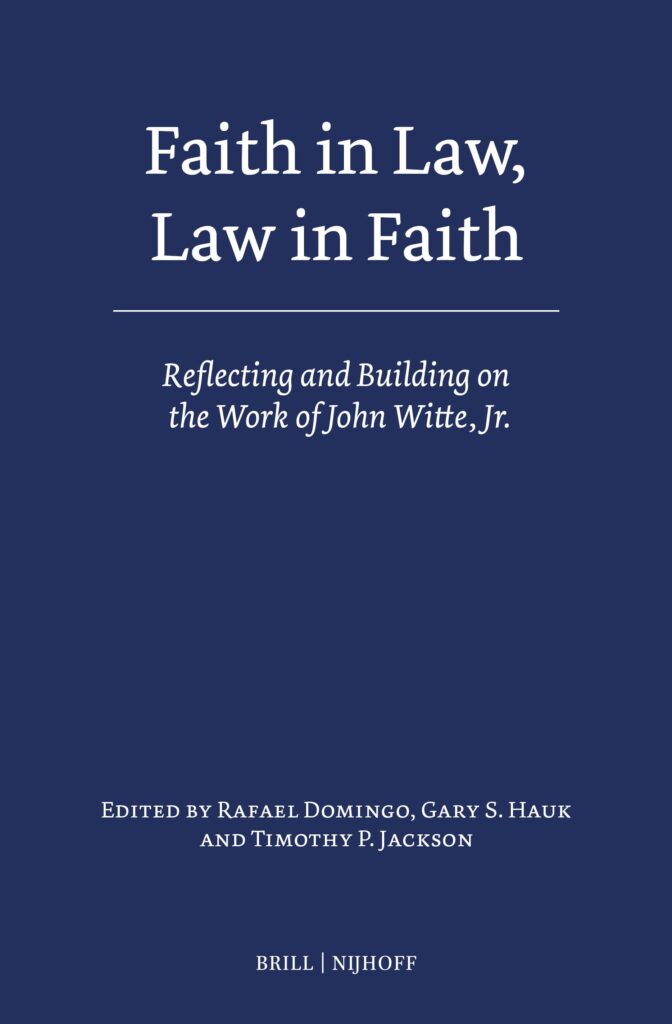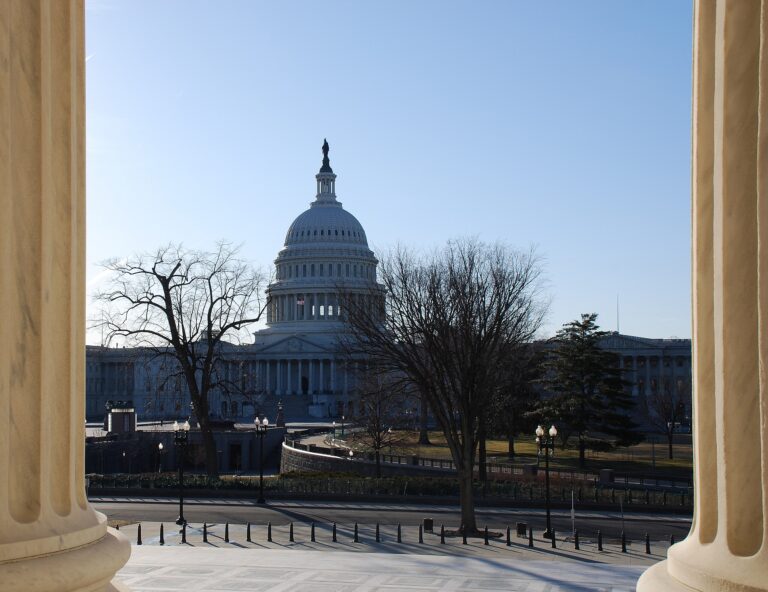
John Witte, Jr. On Christianity and Law
Rafael Domingo
The following is an adapted excerpt from the chapter “John Witte, Jr. On Christianity and Law” from the book, Faith in Law, Law in Faith: Reflecting and Building on the Work of John Witte, Jr. (2024). Reprinted under Creative Commons Attribution Non-Commercial License (CC-BY-NC). This is part of a series of Literature Highlights dedicated to celebrating John Witte Jr.’s work. Read more here.
Intuitions are the point of departure and driving force of all serious academic research. We come back to them time and time again throughout our academic lives, just as we return to our birthplace and family home. These intuitions may be original or shared, often reach beyond our own area of knowledge and, every now and then, shed new light on an old idea, opening up a new horizon for knowledge. The intuition that has marked Witte’s academic life, which he shared with his mentor Harold J. Berman, is that law and religion have more in common than is apparent at first sight: that law has a religious dimension and religion a juridical one. Religion and law share origins, principles, values, rites, customs, rituals, formalities, methods, concepts, and hierarchies, and they depend on each other. When this interaction is culturally hidden or even manipulated, religion is diluted into ethereal spiritualism, and law is reduced to coercive regulatory imposition. But when law and religion are held in healthy dialectical relation (1-35), each side is improved by the other, and society and its core institutions are best positioned to achieve justice, peace, order, and freedom (230-44).
This fundamental intuition that Witte shares with Berman (23-27)—his beliefs about “faith in law, and law in faith,” as this book’s title captures it—is very old (17-30), even pre-Christian (49-72,) as Witte recognized already in his earliest published work (101-43), in 1981. His work has consisted in part in excavating this enduring intuition, and applying it with new insights and overtones in a pluralistic and secularized society. To highlight this intuition’s long lifespan (310-40), one only needs to point out that the Latin word for law (ius) is derived from the god Jupiter, or that the ancient Romans used the word sacramentum to refer to judicial processes in ancient legal times, many centuries before Christianity began using the same expression to refer to the signs instituted by Christ by which divine grace is dispensed to humans. For forty years, Witte has been applying and developing this fundamental intuition about law and religion in various fields of legal history, in line with his personal convictions and abilities, but above all with his deepest experiences: his attachment to Protestantism, his love for his family and friends, and his respect for human rights.
Relations between Christianity and Law as an International Project
Witte uses a broad definition of Christianity that encompasses the three major Catholic, Protestant, and Orthodox branches, as well as various denominations within them. To date, the Orthodox world is the most underrepresented in the law-and-religion field, thus fulfilling the old Latin adage that law indeed comes from the West, just as light comes from the East: ex Oriente, lux; ex Occidente, ius. Witte has worked hard in his projects to include Orthodox voices alongside other Christian views. Witte refers to law in its broadest sense, which is also the one that best captures its meaning. Law is a regulatory social order of justice, powers, rights, and freedoms, exercised and maintained by institutions that exercise authority individually or collectively, and that affect local, national, international, and global private and public human relations. Witte has approached this massive project in law and Christianity from three different perspectives: one that we could call merely relational, another biographical, and a third jurisprudential (57-66). Though operating in different stages of his work, these different perspectives coincide in time and are cumulative and mutually supportive.
The Relational Perspective
From the relational perspective, Witte has sought to map the historical, conceptual, categorical, and dogmatic ties between Christianity and law, both as ideas and in their most varied institutional forms and ramifications. This relational perspective was strongly consolidated with the publication of his early book on Christianity and Democracy in Global Context. The conclusion one draws from reading it, in line with Jacques Maritain’s stance, is that democracy was morally and legally enhanced when it became symbiotically related to Christianity. Early modern Protestantism first embraced the democratic ideal; centuries later, modern Roman Catholicism followed suit, especially with the Second Vatican Council, but above all with John Paul II, who applauded the idea of civic participation and collaboration and peaceful succession among rulers. On the other hand, the tie between Orthodox Christianity and democracy is much weaker, and perhaps this partly explains why Orthodox-majority countries have lagged behind in the process of democratic transformation.
Witte’s analysis of the relational perspective of law and Christianity matured and gained new momentum with the publication of his monographs on Law and Protestantism: The Legal Teachings of the Lutheran Reformation (2002), Sex, Marriage, and Family in John Calvin’s Geneva (2006), and The Reformation of Rights: Law, Religion, and Human Rights in Early Modern Calvinism (2007). While the relationship of Protestantism and law1See forthcoming volumes, Sex, Marriage, and Family in John Calvin’s Geneva 2: The Christian Household and A New Reformation of Rights: Calvinist Contributions to Modern Human Rights. has continued to occupy him as a scholar, Witte took a much broader, pan-Christian and interdisciplinary view in Christianity and Law: An Introduction (2008), a volume coedited with his colleague and friend Frank Alexander. This volume constituted Witte’s roadmap for the coming years, as he eventually turned each chapter of the book into a new volume that further studied the relationship between Christianity and law in each specific area of law. Several other volumes in this series of introductions to Christianity and law are in print, most of them with forewords or chapters by Witte, engaging Christianity and freedom, natural law, justice and agape, private law, church law, international law, the laws of conscience, market regulation, migration, and taxation (57-66). Forthcoming in this series are new studies on Christianity and the law of alternative dispute resolution, capital punishment, child law, constitutional law, disability law, education law, evidence law, environmental law, health law, intellectual property law, labor and employment law, legal ethics, poor law, and social-welfare law.
Once the project had expanded and been applied to a broad variety of fields of law, Witte decided to embark on a major review, recapping the best of Christianity’s influence on law in a new, more comprehensive global work The Oxford Handbook of Christianity and Law. In this collection, which he and I coedited, more than sixty experts from five continents address the relationship between Christianity and law from a historical, theological, juridical, and philosophical perspective. The work sums up Witte’s four decades of work on this subject and, at the same time, is a new roadmap for studying this fertile relationship of Christianity of law historically and in our current age of secularization and globalization.
The Biographical Perspective: The Idea of the Christian Jurist
The second perspective from which Witte analyzes the relationship between Christianity and law is biographical. This is no longer just a matter of putting together two ideas and analyzing similarities, differences, and reciprocal influences and connections throughout history, but of ascertaining how Christianity and law are forged and intertwined in the minds and hearts of specific Christian jurists, philosophers, and theologians who, with their writings and actions, have guided law along the paths of justice. In essence, this biographical perspective is a projection of Witte’s own experience as a Christian jurist. Christianity is not a passing fashion, but rather touches upon an essential part of every person’s being as well as supernatural being. Ius ex persona oritur, we could say in the manner of the classics: “law comes from the person (XVI).”
The category of Christian jurist encompasses any Christians who have devoted themselves to the cause of justice in its broadest sense and have had a significant impact on law and the legal system. Being a Christian jurist does not necessarily entail having a law degree or having practiced law; rather, it involves having made an important contribution to law that has enlightened legal systems and political communities with Christian values. This biographical approach is based on the empirical fact that specific human beings, flesh and blood, are behind the significant developments and reforms of law.

The biographical approach has great potential for the study of law and legal history because it shows both the complexity and ambiguity and even the accidental nature of historical and modern legal systems. What lies behind legal documents and rules are facts and, beyond them, people. The who of the person always prevails over the what and the how. To the extent that critical legal actors are Christians, the law and legal systems that they shape are, of necessity, imbued and permeated with their Christian values and beliefs. The reason is that legal systems are simultaneously a whole in themselves and thus, to a degree, self-sufficient, but also a part of and thus interdependent with other parts of society. Christian jurists participate not only in legal institutions and the church but also in many other institutions in their societies, thus carrying their faith into those other systems.
The Jurisprudential Perspective: Toward a Christian Jurisprudence
The third perspective from which Witte addresses the relationship between Christianity and law endeavors to build a general jurisprudential framework, based on Christian values, for a pluralistic society. Following in the footsteps of his mentor, Harold Berman (215-28), who at the end of his academic career devised an “integrative jurisprudence,” Witte is seeking theoretically to integrate and harmonize the Christianity-law relationship by creating a narrative suitable for a pluralistic, post-Christian society (439-52). One glimpses a change of focus in Witte’s intellectual project—from “retrieval” of the relationships of Christianity and law and the teachings of great Christian jurists to “reconstruction” of a Christian jurisprudence for our modern day.
Witte judges that the necessary protection of nonbelievers and secular thought is not a sufficient reason to erect a Berlin Wall between law and religion, particularly between Christianity and law, as if their relation were a taboo subject. Any exclusion of religion from the public sphere will always be artificial, because law has an unavoidable religious dimension. In the West, this religious dimension is mainly Judeo-Christian. It is not surprising that, in his acceptance speech upon receiving an honorary doctorate in theology from the University of Heidelberg, Witte used the metaphor of the cathedral to refer to law:
“The law is like a massive medieval cathedral, always under construction, always in need of new construction. It stands at the center of the city, at the center of matters spiritual and temporal, at the center of everyone’s life (466-67).”
Triads Towards Theory
As Witte is so fond of triads (XIX), I will venture to turn to them in this initial phase of this new, more theoretical perspective in order to encourage Witte to continue along this path. In addition to the triads he has already generated, I offer four more that I think capture. Witte’s thinking, and which I gladly submit for consideration and critique.
Christianity, Community, Culture
The doctrine of the Trinity understands God relationally. The Triune God is certainly a unique and absolute unity, the Absolute One, whose three divine persons manifest the pure communication of love, the most profound depths of free self-giving. Each divine person freely gives the plenitude of love to the others, glorifying them (37-55). This revealed truth serves to illuminate a united and diverse political community; the greater the diversity, the greater the unity, and the greater the unity, the greater the diversity. This sense of communal inclusion, which does not exclude other communities but rather affirms that all are part of a global community, calls for a cultural change. Our Western secularized culture has often promoted fragmentation, territorialization, and exclusionary nationalism.
Creation, Covenant, Conscience
Creation occupies a central place in Witte’s thought. It is a manifestation of God’s infinite love, which permeates the entire universe, and most particularly the human being, made specifically in God’s image and likeness (Genesis 1:27). Creation establishes a covenant between God and humankind over the created order. A covenant institutes a more solid and permanent framework than a contract, because the covenant includes the natural order of creation and assumes a conceptual framework of truths that cannot be altered by mere human consent. God does not enter into contracts, but God does enter into covenants. Moreover, every human contract that respects the natural order and puts God as a witness becomes a covenant (for example, marriage). Conscience is a divine light within human beings that helps them to interpret God’s will in every covenant (169-89). This creation-covenant-conscience triad clashes with a world vision based on mere chance without creation, where human liberty is reduced to simple freedom of choice without respecting the natural order, and the conscience is mistaken for personal conviction without a recognition of prior truths.
Law, Liberty, Love
Christianity has elevated law, liberty, and love to a new divine order. Law cannot be reduced to pure legalism because justice reaches all dimensions of reality and participates in the same created order (ius divinum). Liberty is a gift of God to fulfill our obligations to God, to ourselves, to others, and to the universe as such. Liberty is the necessary, though not sufficient, condition for fully loving God and, in God, all creatures and the created universe. Law’s mission is to protect this liberty as one of the most precious divine gifts (290-303), as it is to protect and impart justice: without justice there is no love, and love perfects justice by imbuing it with charity. This triad of love, liberty, and law is in direct opposition to the triad that reduces law to legalism, freedom to arbitrariness, and love to personal satisfaction.
Sovereignty, Society, Solidarity
Witte employs a broad concept of sovereignty, inherited from Abraham Kuyper, which can be applied to God, to the nation-state, to the smaller political community, and to all institutions (family, church, school, business) and power structures that order society according to the principles of liberty and justice. Witte conceives society as a network of relationships and institutions united by the bonds of cooperation and solidarity, a solidarity born of the sharing of all human beings in the one and only image of a Triune God. This law of human solidarity, without excluding the rich variety of persons, cultures, and peoples, assures us that all men and women are truly brothers and sisters.
Over time, Witte has spearheaded a bold and far-reaching project that aims to encompass the relationship between law and Christianity as such, in which more than five hundred scholars from five continents are collaborating, making him one of the leading scholars in the field. He is working on this contribution from three perspectives: a purely relational one, a biographical one, and a jurisprudential one. The theoretical and jurisprudential part is fundamental to consolidate and complete his life-long project. This theoretical part could be based on the four alliterative triads that I now suggest, inspired by Witte’s works: a) Christianity, community, culture; b) creation, covenant, conscience; c) law, liberty, love; and d) sovereignty, society, solidarity. ♦

Rafael Domingo is the Spruill Family Professor of Law and Religion at Emory University and Alvaro d’Ors Professor of Law at the University of Navarra. He is the author of the book God and the Secular Legal System (Cambridge University Press, 2016).
Recommended Citation
Domingo, Rafael. “John Witte, Jr. On Christianity and Law.” Canopy Forum, August 21, 2024. https://canopyforum.org/2024/08/21/john-witte-jr-on-christianity-and-law/
Recent Posts










